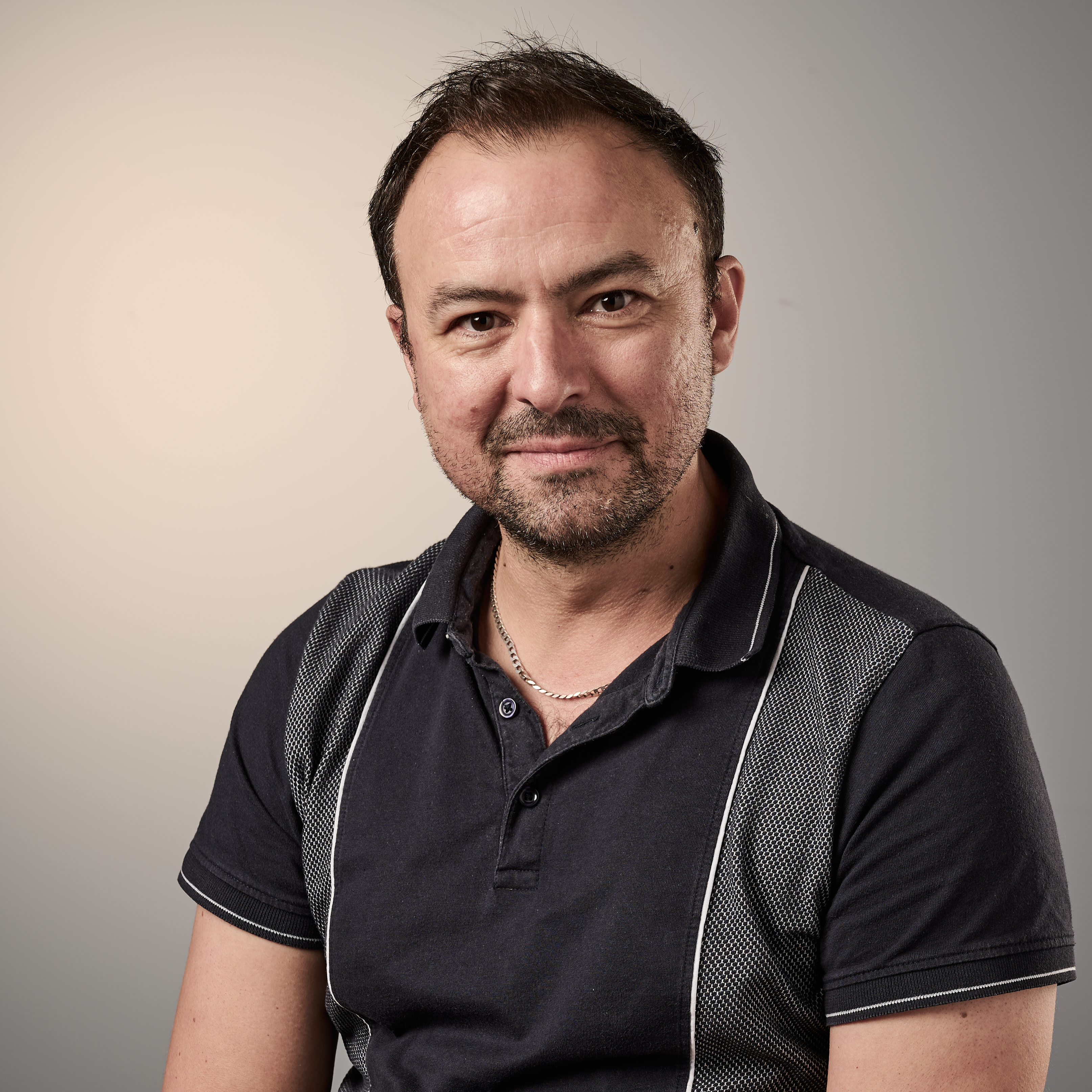'You cannot put a lion in a cage': How Peter Sagan earned the titles 'Rambo' and the 'Terminator'
We look back on the career of one of the modern era's most enigmatic cycling stars, with the help of those who knew him


The latest race content, interviews, features, reviews and expert buying guides, direct to your inbox!
You are now subscribed
Your newsletter sign-up was successful
There will be something missing from this year's WorldTour. A Peter Sagan-shaped hole has opened up as the enigmatic Slovak retires from top level road racing. He hasn't gone completely though – he is staying on to target the mountain bike race in the Paris Olympics in August.
"You cannot put a lion in a cage," says Sagan's old boss at Bora-Hansgrohe, Ralph Denk. He was talking about letting the Slovak off the leash to enjoy mountain biking or skiing during the off-season. But with Sagan's recent retirement from the WorldTour, it feels like that metaphor has never been more apt. The ultimate uncaging.
Over the course of a wildly successful pro career Sagan, now 33, earned the nicknames 'Rambo' and the 'Terminator', conjuring an image of someone you'd probably run a mile from before asking for an autograph.
And while as a pro rider trying to win races, Sagan was definitely not someone you would want to encounter at the sharp end of a tough one-dayer or a bunch sprint, his contemporaries paint a picture of a soft-spoken, diligent and sometimes playful person – not scary, at least until you tried to beat him to the line.
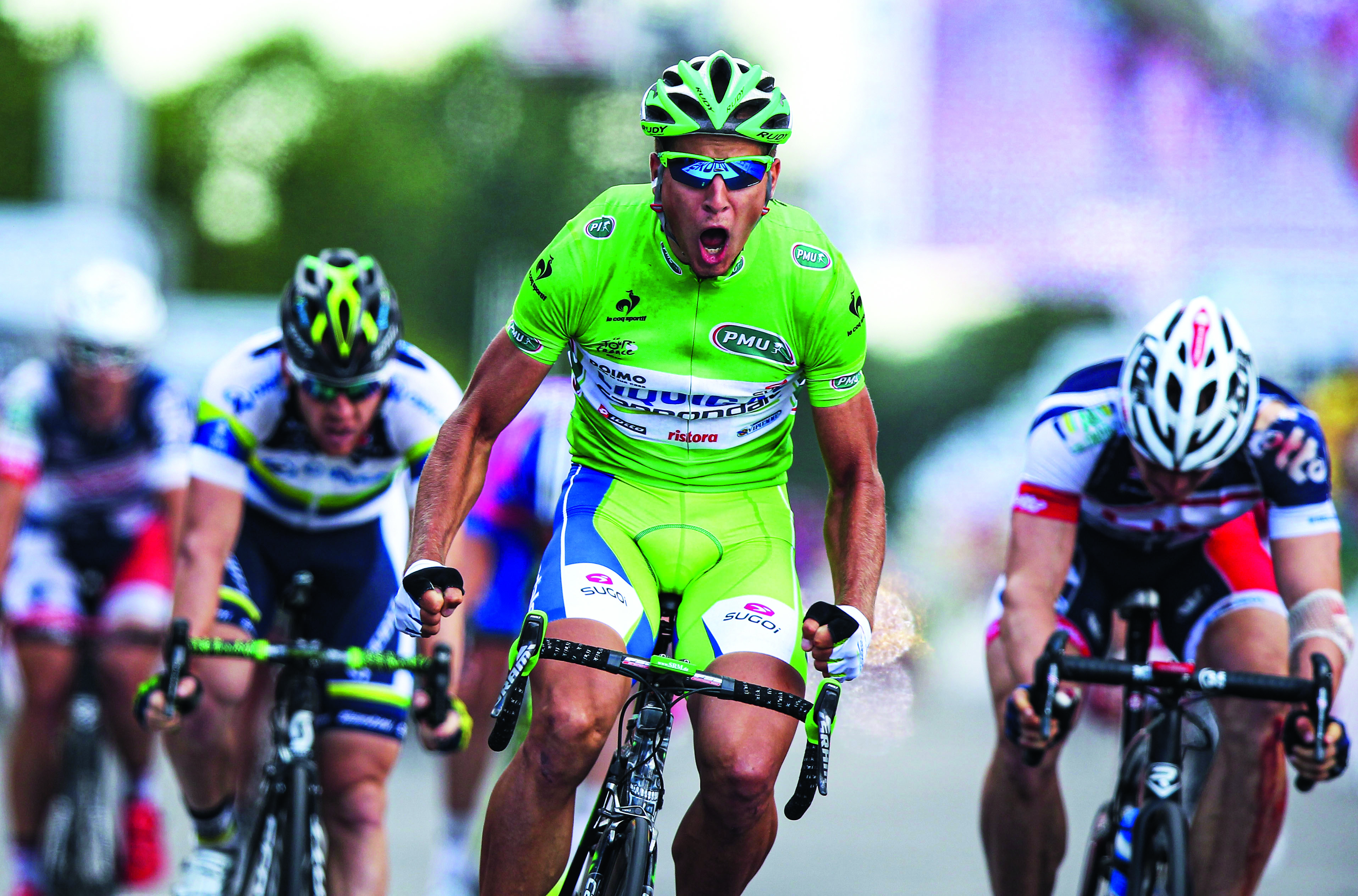
Oliver Naesen, who was a key rival for Sagan during the Slovak's halcyon period, describes him as having "silent class".
"He wasn't a screamer," says the Belgian Ag2r-Citroen rider, who has podiumed in races including Milan-San Remo, Gent-Wevelgem and E3. "Even though he had the funky hair and you know, the ski goggles and the podiums and all that.
"I think that was just like, a way of expressing himself. In the bunch he was almost always silent. Just you know, only chatting to those guys close to him. He was actually quite discreet."
The latest race content, interviews, features, reviews and expert buying guides, direct to your inbox!
Despite being the same age, Naesen says he had always looked up to Sagan, having started later.
"He was one of those idols you look up to on TV," Naesen says. But even when the pair became contemporaries, he never totally figured the Slovak out, he says. "There was always some mystique around him, you know. I never really knew what was going on in his head. That's what I always felt."
The mystique that Naesen describes is undeniable, certainly from the outside. Sagan's interviews have often left the listener with as many questions as answers. The impression was that he fostered the air of mystery and cool that seemed to surround him, or at least enjoyed it.
Having won his historic third World Championship in 2017, you might have expected him to be bouncing joyously off the walls in the post-stage press conference. Not a bit of it.
Mostly, he seemed keen to show off his motocross goggles, but once the press pack had managed to get him to focus on his incredible victory, he told us. “Very nice. I don’t know how it’s going to change something in the world, but for me it’s very nice, yeah.”
Understated is not the word.
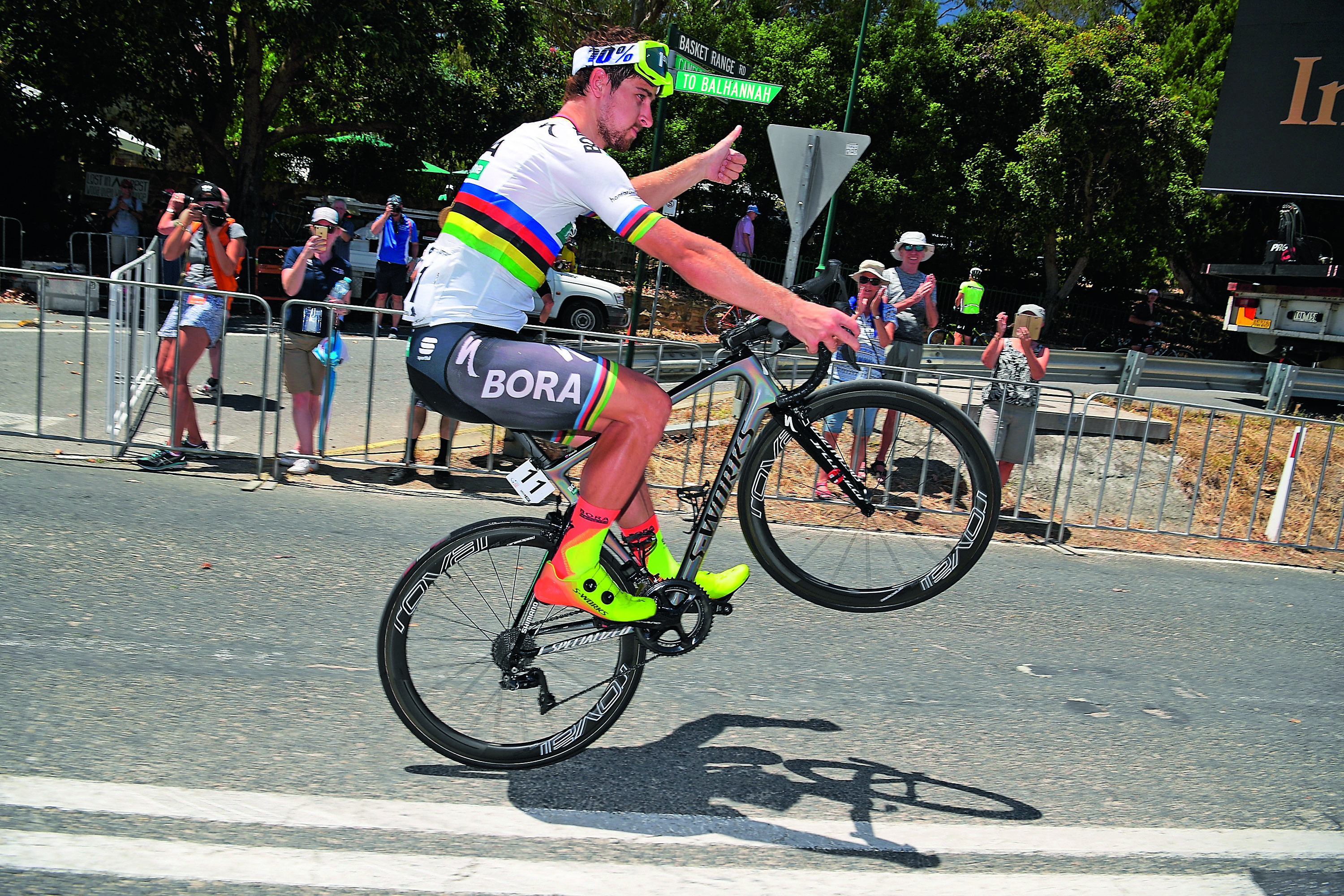
Asked about strategy, he shrugged: “What was my strategy? I have no strategy"; and as to the possible reason why he found the World Championship easier than the Classics: "I don't know, karma?"
On occasion Sagan could move from laconic to disagreeable. In one pre-Classics press conference that year, he berated a journalist for asking him a fairly run of the mill question about his goals, saying: "do I come here and ask you about your goals?"
While Sagan wasn't always the most helpful in interviews, he had another, playful, side. The side that loved to thrill Tour de France crowds with wheelies (his final-mountain wheelie each year became something of a trademark). He's partial to a bit of face pulling and in 2016 even recreated the video to the Grease hit 'You're The One That I Want' with his then wife Katarína Smolková as part of a sponsorship deal with Slovak health food company Sun-Root.
He found out early on in his career that there was a line to be drawn though, and was forced to apologise after pinching a podium girl's bottom at the 2013 Tour of Flanders, in which he finished second. That wasn't his only brush with disapproval either – Sagan was disqualified from the 2017 Tour de France after being judged to have caused Mark Cavendish to crash and break his shoulder in the bunch sprint on stage four.
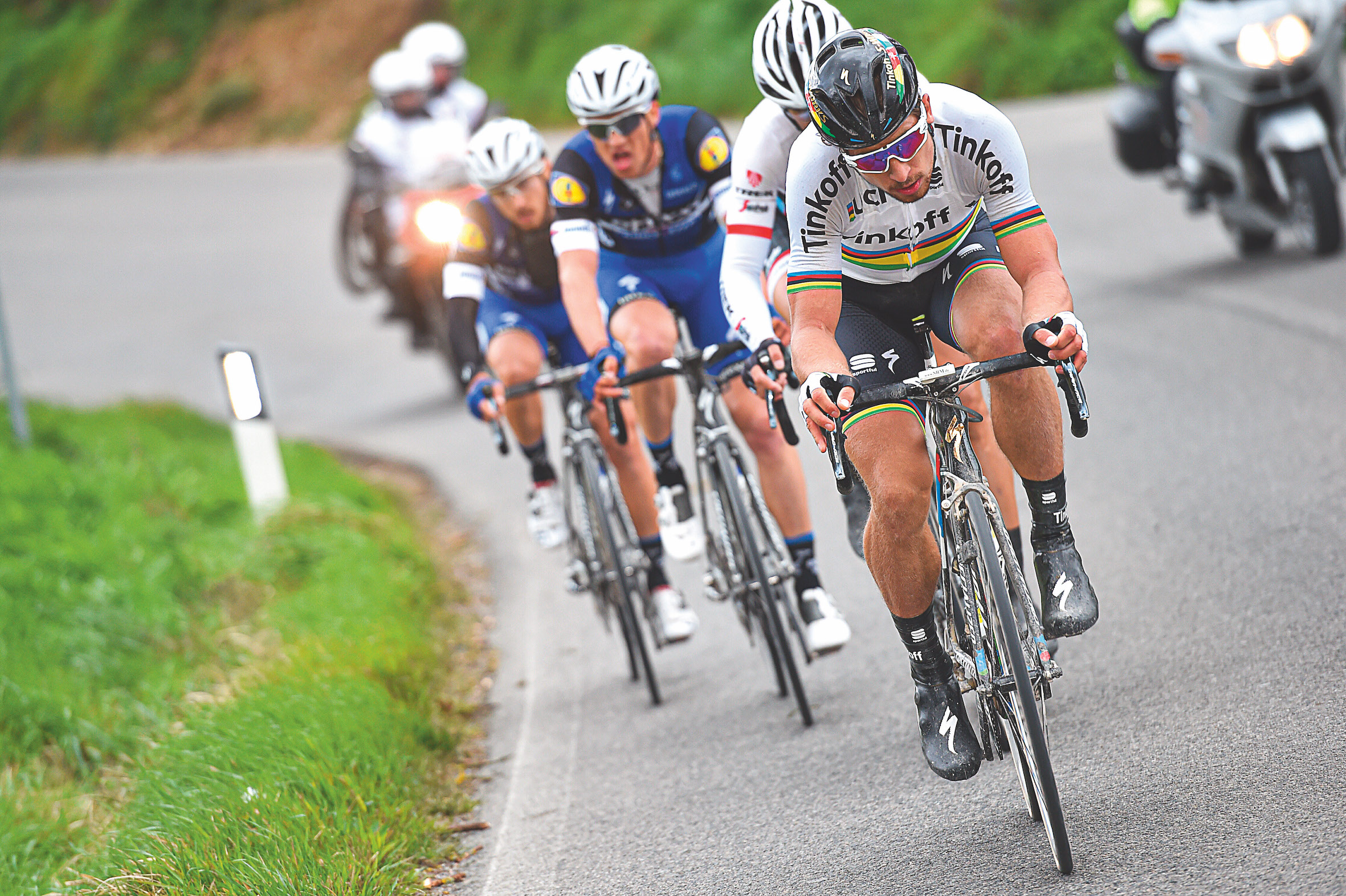
But while Sagan's public persona seemed to veer between ice-cool laconicism to foolish to flamboyant, behind the scenes the Slovak is nothing but diligent, says his former sports director Sean Yates.
Yates shepherded the Slovak during two very successful years at the Tinkoff team, which saw Sagan win the Worlds, a brace of Tour de France green jerseys (two of a career total of seven) and the Tour of Flanders, among others.
"My first experience of him there was when we did Kilimanjaro as a team building thing in the December [2014]," Yates says. "Everybody only had a small backpack, you know, and porters carried everything else."
The exception was Sagan, who insisted on carrying everything he needed in a full-size rucksack.
"He had a proper full mountaineer rucksack with whatever, 30, 40 pounds in it. It gave an indication of how strong he is, and showed he wasn't scared of making it harder than it could have been for himself," Yates says.
He adds: "I mean for me he was just 100% genuine super-nice, super-respectful, super-friendly… not scared to be a team player, thankful for his team-mates, thankful for everyone around him, and not at all big-headed. For me he's more than a cyclist, he's just a super-nice guy."
As an example, Yates recounts how, having had a terrible accident at the end of 2016 when he fell out of a tree, he went to watch the Tour of Flanders the following April, and by chance bumped into the Bora team – and Sagan – the day before the race.
"Bora came past and he saw me… it'd obviously been six months since he'd last seen me, and he swung over and came over and gave me a hug, you know, as his team rode off into the distance. That just spoke volumes of how he was."
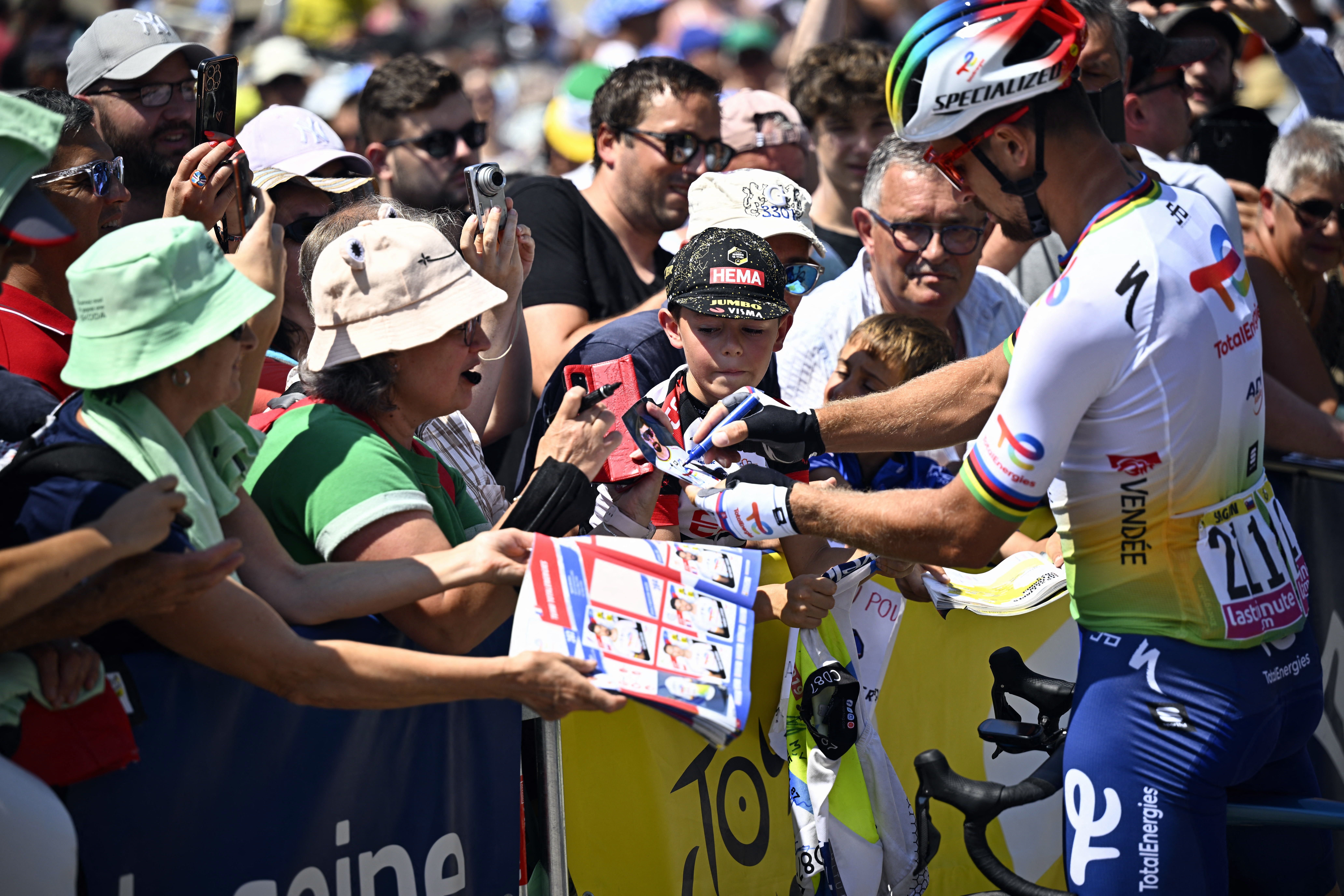
In terms of wins Yates concedes Sagan's time has "kind of run out". Aged just 33 it's an early retirement, perhaps due in part to how early the Slovak started winning, Yates agrees.
"It shows that even the best can't keep going forever," he says.
Ralph Denk, Sagan's boss at Bora where he was from 2017 to 2021, had a similar tale to tell about a hard-working rider that the young team members looked up to.
"In the preparation period Peter was super, super serious. He was always focused on the goal," Denk says. "On the other hand, he found the right balance. In the off-season he had fun.
"For sure he was also a personality that was not just thinking about cycling all the time."
Denk would allow Sagan to explore his life away from the structures of road cycling on occasion, he says. "You cannot put a lion in a cage. If you want a lion to be happy you have to give him some freedom. I gave him the freedom to go mountain biking and skiing, and I tried to find the right balance between fun and risking his career."
Denk also points to Sagan's resilience, giving the example of his ability to stay professional even while going through his divorce in 2018.
"For me that was impressive. He managed that really, really well, very professional," Denk said.
Like Yates, Denk says Sagan's early success may well have influenced his early retirement.
"He started winning super super early. I think that's the reason. Maybe now the tank is completely empty. In my opinion, every top-class rider has a limited period to be on the highest level. That's maybe why at the end of his career he's missed a bit of success, but it doesn't matter, he has a lot of victories in the pocket – iconic victories."
It's true, Sagan's results have dropped off dramatically in the past couple of seasons – in fact this year is the first since he turned pro in which he has registered no wins. But Sagan isn't losing any sleep over it.
"I've nothing to prove any more," he said at this year's Tour de France. “What I did is done... It’s also a very nice period of my life – all the things I did in road cycling. But everyone has to finish at some point."
There was no emotional goodbye to the race that has furnished him with seven green jerseys, and while he may have been a touch more contemplative behind the scenes, the first comment he made in Paris was, "I'm so glad it's the last one."
He will now revert to mountain biking, saying "where I started I would like to finish" a nod to his early days on fat tyres. But despite there being Olympic medals at stake it's mostly for fun, he insists, adding that he might end up continuing on MTB if it goes well.
Have we seen Rambo's last stand? Or will retirement be Terminator's (re)genysis? Either way, the WorldTour has waved goodbye to that rare thing – an ultra-successful bike rider with rock star character, one who won't be forgotten in a hurry. The lion has finally been uncaged.
This article first appeared in Cycling Weekly magazine Nov 23, 2023
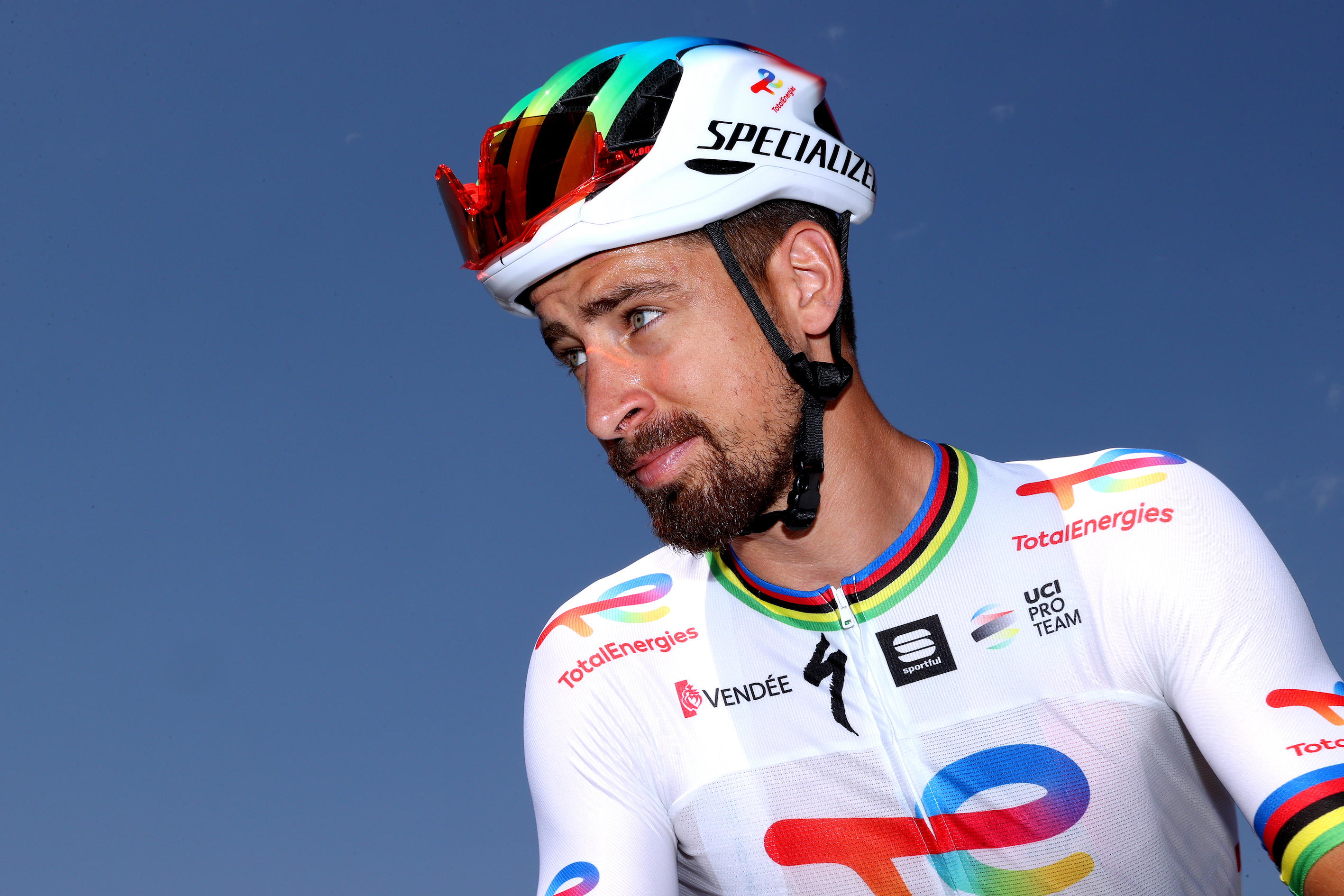
On file: Sagan facts
Age: 33
Nationality: Slovak
Born: Žilina, Slovakia
Height: 1.82m
Weight: 78kg
Career wins: 121
Career length: 15 seasons
Teams: Liquigas/Cannondale; Tinkoff; Bora-Hansgrohe; TotalEnergies
Biggest victories: 7 x Tour de France green jerseys, Tour of Flanders (2016), Paris-Roubaix (2018), 3 x World Championship road race (2015-17)
Top career moments
Gent-Wevelgem 2013
From a small group of favourites, Sagan followed then countered Stijn Vandenbergh's attack with 4km to go, as the race reached Wevelgem. His rivals' initial hesitancy to chase gave Sagan all the leeway he needed, and he went on to finish solo with 23 seconds in hand.
Tour de Suisse 2011 stage 3
After GC hopeful Damiano Cunego attacked off the day's final climb, the Grosse Scheidegg, only Sagan looked to have any chance of catching him. The pair engaged in a thrilling high-speed pursuit on the descent, which continued its downhill twists and turns even in the streets of finish town Grindelwald. It was here that Sagan edged out Cunego on a bend to take an impressive win.
Tour de Suisse 2012 prologue
This was Sagan's only time trial win in a WorldTour race, his most prestigious win against the clock. He was up against none other than Fabian Cancellara, riding his home race, yet still managed to win the 7.3km test around Lugano by four seconds.
World Championship 2017
The way Sagan overcame such a huge amount of pressure to take this historic third victory deserves a whole lot of recognition, as does the feat itself: three Worlds wins in a row. It had never been done before by a male pro. All day long he hid quietly in the bunch, before leaping out in the final 200m to outdrag home hope Alexander Kristoff to the line.
Paris Roubaix 2018
Having won the Tour of Flanders and the World Championships, plus Gent-Wevelgem and E3, Paris-Roubaix was notable by its absence on Sagan's palmarès. That changed come the 2018 edition, when he attacked from the bunch with 54km to go, picking up early breakaway Sylvain Dillier and going on to sprint to victory in the Roubaix velodrome.
Tour of Flanders 2016
Sagan had scored two top-fives in the event already come 2016, with a win a Gent-Wevelgem and second in E3 already under his belt that season. Many were watching Fabian Cancellara in what was his swansong Flanders, but Swiss dreams were thwarted when Sagan kicked on over the Oude Kwaremont, cementing his lead on the Paterberg and going on to win.
Tour de France 2016, stage 11
Perhaps inspired by his Flanders win earlier that year, Sagan showed the world that he could do more in the Grand Tours that win bunch sprints, attacking on the run in to Montpellier in strong winds with no less than Chris Froome, plus Maciej Bodnar and Geraint Thomas. While that was unpredictable, Sagan's eventual win in the eventual three-up sprint was less so.
After cutting his teeth on local and national newspapers, James began at Cycling Weekly as a sub-editor in 2000 when the current office was literally all fields.
Eventually becoming chief sub-editor, in 2016 he switched to the job of full-time writer, and covers news, racing and features.
He has worked at a variety of races, from the Classics to the Giro d'Italia – and this year will be his seventh Tour de France.
A lifelong cyclist and cycling fan, James's racing days (and most of his fitness) are now behind him. But he still rides regularly, both on the road and on the gravelly stuff.
